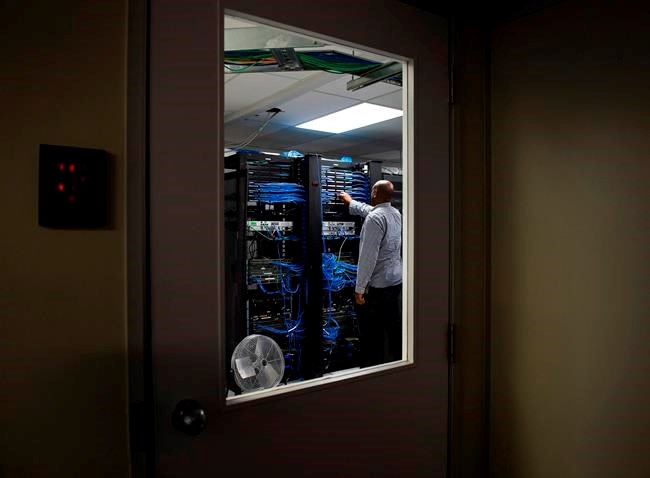The province is experimenting with the technology behind Bitcoin in a pilot project that could change the way data is shared and stored.
The Ministry of Citizens’ Services is testing “blockchain” technology, beginning with a trial around business registration.
“We’ve been doing some research and experimentation with some open-source blockchain technology,” said Ian Bailey, assistant deputy minister of technology solutions. “It’s early days, but it looks very promising as a way that we can share information across jurisdictions and between organizations.”
Blockchain is the technology underlying Bitcoin, the world’s most popular digital currency.
A blockchain is a decentralized, distributed, public ledger of transactions that is considered more secure than other digital record-keeping.
In its pilot project, Bailey said the province is focusing on the exchange of business information, in hopes that it will make the process more efficient and secure.
Currently, a B.C. company would register in B.C. and then again other provinces. But if the business owners forget to do their annual filings or change their address without notifying each jurisdiction, their registration could be suspended.
Instead of having to phone each jurisdiction and track down the problem, any changes to the shared record would be automatically recorded through blockchain.
“It’s not so much whether you can or can’t [fix the problem], it’s the degree of difficulty. So I think the experience with more conventional technologies is they’re not purpose-built for securely exchanging information the way blockchain and distributed ledger is,” Bailey said.
Bailey said it is too early to say whether the pilot project is a success. “We’ll have a better idea later in the spring as to whether we think this is something we should move forward with.”
The biggest concern with blockchain is the technology is so new and changing rapidly, he said.
According to a Deloitte report, Canada is among more than a dozen countries running blockchain trials. In Estonia, the government is piloting a blockchain-based solution for voting, the United Arab Emirates is studying its use in central bank operations and the state of Delaware is piloting a blockchain-based corporate registry.
Last month, American technology giant IBM Corp. pushed the B.C. government to use blockchain to track marijuana sales through the supply chain.
In its submission during the province’s consultation process on marijuana legalization, IBM said the technology could help the government limit or eliminate black market sales by tracking cannabis through the entire supply chain — including where and how cannabis is sourced, sold and priced, from seed to sale.
Victoria Lemieux, who leads a blockchain research and education cluster at the University of British Columbia, said there remain many challenges, since the technology is so new.
“If you think of the early days of the internet, there were challenges then, too. I think that’s kind of analagous to where we’re at with blockchain right now. It has tremendous possibility, but we’re still figuring out technicalities from a legal, social and technical standpoint,” she said.
But she said it also has the potential to transform financial institutions and disrupt how governments work. “We certainly see it disrupting regulation. There’s work going on for land-transaction recording in countries all over the world,” she said.
Lemieux helped set up the cluster as a complement to the industry-driven innovation surrounding blockchain in 2016, with a federal grant. The cluster brings together experts in technology, law, archival science, accounting, medicine and privacy.
“There really wasn’t a lot of academic research at that time. A lot of innovation was coming out of, not surprisingly, the tech sector,” she said.
“There was a lot of hype, a lot of people developing solutions that claim to do certain things they didn’t really do. But I also saw an opportunity to help them in the design of solutions to do the things they wanted to do.”
The cluster has worked with First Nations to apply blockchain to Indigenous sovereignty and hunting rights, as well as with the Land Titles and Survey Authority of B.C. to apply it to land record-keeping, she said.
Lemieux sees opportunities for blockchain in many areas. Because it’s so secure, it could encourage more participation in medical studies. The technology would allow sensitive medical information to be shared in a way that allows individuals to maintain control over their own data.
Lemieux described blockchain as a record-keeping system based on transactions. “All of these transactions get bundled together into blocks. Those blocks get chained together cryptographically. So there’s a computational puzzle-solving, using cryptography, that chains those blocks together in a way that makes it very difficult to make any changes to the information that has been added to the blockchain without detection. So basically, it protects the integrity of the information,” Lemieux said.
All copies of the ledger get shared across a network, so instead of one copy, there may be 10,000. But if you change your copy, it would become immediately apparent across all 10,000.
She said the benefit to governments comes in situations where there are multiple stakeholders.
“Think about when you’re buying and selling land: There’s the buyer, the seller, the registration authority, the bank that gives a mortgage,” she said. Blockchain allows you to conduct transactions between those stakeholders digitally and without a lawyer. “You may not need some of those intermediaries who are there to establish trust. So it may transform the way some transactions are carried out,” Lemieux said.



